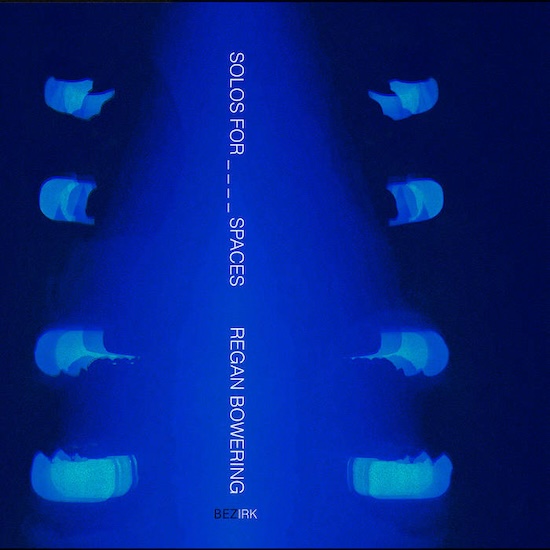There is something deeply unsettling about recursion. Whether a simple Droste effect created using mirrors held up to each other or feedback from a microphone picking up its own output, these phenomena confront us with the strangeness of the fabric of reality, allowing us a peek into the oblique mathematical nature of everything around us. There are moments across the full-length debut Solos for spaces by London based percussionist, improviser, and sound artist Regan Bowering that allude to a similar sense of the infinite, as sounds from her augmented drum set echo, swell, and spring across spaces.
The sequencing of the album follows a spiral of sorts. The pieces are arranged to start with the vast ‘Coil (Homage to Hugh Davies’ “Music for Two Springs”)’, recorded at the Goldsmiths George Wood Theatre, and end in the virtual, DAW-created reality of ‘Cleave’. The former opens in near silence, with the intrinsic hum of the theatre seeping in. At first, Bowering’s interventions are indistinguishable from the venue’s backdrop. Captured using a Zoom recorder, the lowly yelps of scraped drum skins feel lost and yearning, as if trying to find their bearing in the surrounding emptiness. Screeches turn into undulating feedback, supported by the occasional drum hit – just as shivering and uncertain – and keep on growing, until they’ve become a billowing, all-saturating texture.
While the first cut alludes to an expansive compositional sensibility fascinated with perception (and manipulations thereof) à la Alvin Lucier’s or an improvisation-cum-noise approach in the vein of Jeremiah Cymerman and John Wiese, the following three cuts become gradually more compact and to the point.
Counterintuitively, the lengthiest of the four tracks, the 16 minutes long ‘Grain’, is perhaps the most grounded. Recorded at London’s Avalon Café, it instantly reflects the more intimate setting, wobbling along a grating sequence of vibrations and pulses that fade in and out, repeat, and intensify, morphing into a single sustained tone. As things continue evolving, the unified frequency loses coherency again, at times evoking a harmonica’s nasal vibrato, at others the thundering feedback of a guitar riff or a muted trumpet lick, while the subtle clicks of a drumstick hitting the snare rim maintain a muffled, unstable rhythm.
The studio recording ‘Hold’ hones things further, unfurling modulating textures into an intoxicating crescendo, while ‘Cleave’ takes material from all previous cuts and assembles it into abstract electronic figures, like a fragment of Morse code traversing through space, searching and grasping until finding an almost-beat that would fit right in on a record by synthesists Thomas Dimuzio and Daniel Menche.
Solos for spaces is a play of contrasts, contradicting voluminous expressions with confined phrases, taming resounding feedback with faint percussive flutters, but one that feels driven by the desire to craft electrifying drama – a sensation as unsettling as the idea of recursion – rather than pure autotelic dissonance.


